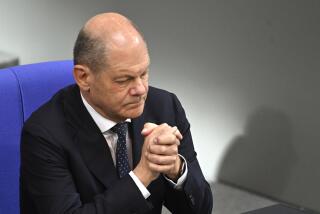EU holds more migration talks as calls for answers grow
- Share via
BRUSSELS — The European Union’s two emergency meetings on the migration crisis this week won’t provide any quick solutions to ease the plight of tens of thousands of people seeking sanctuary in Europe despite a decision Tuesday to share 120,000 more refugees arriving in Greece and Italy.
As the EU scrambles to respond to scenes of people charging razor-wire fences, suffocating in trucks or bodies washing up on beaches, unity has crumbled as nations in the 28-member bloc trade barbs over who is to blame.
Nothing on the agenda of Tuesday’s interior ministers’ meeting or the summit of EU leaders on Wednesday will immediately help countries in Eastern Europe and the Balkans to manage their borders now. Or next week.
No measure will stop the flow of people moving across Europe, nor will any provide relief to authorities in individual EU countries trying to slow them down.
Indeed, more than 6,000 people could arrive in Greece alone over the two days until EU leaders end their dinner debate on medium and long-term policy plans.
“The discussions are completely disconnected from reality,” Doctors Without Borders humanitarian adviser Aurelie Ponthieu said after she and a colleague briefed an almost-empty European Parliament chamber last week about rescue efforts in the Mediterranean. Most EU lawmakers and senior officials decided instead to go to lunch.
The arrival of about 500,000 people this year, mostly through Greece and Italy, has laid bare fundamental divisions between former Communist countries and partners further West over how to manage migration.
Aid groups are imploring the EU to set up safe corridors for people to enter, while the U.N. refugee agency wants the bloc to take Syrian refugees from Middle Eastern countries and Turkey.
But faced even with a humanitarian emergency, the EU gives priority to debates about unity and policy over immediate action to tackle Europe’s biggest refugee challenge in decades.
Wednesday’s summit in Brussels is unlikely to be an exception.
“It is essential to establish a credible migration policy,” European Council President Donald Tusk said in his invitation letter to the leaders.
Differences over migration “cannot be an excuse not to develop a comprehensive strategy or to build a sound migration policy that is effective and responsible while respecting our core values,” he said.
And it won’t be the last meeting of its kind. German Chancellor Angela Merkel said Monday that the “consultations will be important, but they will not lead to the problem we have being set aside. There cannot and will not be a solution overnight; many more meetings and discussions will follow. We will need patience.”
Divisions are starkest when it comes to sharing responsibility for hosting the thousands coming to Europe, around two-thirds of whom could qualify for asylum or some form of international protection.
The Czech Republic, Hungary, Slovakia and Romania are vehemently opposed to any obligatory quotas.
Those four nations drew battle lines on Tuesday over the refugee sharing plan aimed at helping overburdened Greece and Italy.
The interior ministers finally approved it, but the issue was forced to a vote rather than the consensus decision-making preferred in the EU. In an unexpected move, Finland abstained.
Almost surreally, Hungary refused to benefit from the scheme and will now have to accept even more refugees to help out Italy and Greece, which it blames for letting people get through in the first place.
In any case, it could take weeks for the first refugees to actually move and lighten the load on frontline countries. The plan is also due to unfold over two years.
Meanwhile, numbers are swelling. An estimated 3,000-4,000 people arrive in Greece each day. Many plan to move north to set up home in Germany, bringing yet more pressure to overburdened borders as they go.
___
Geir Moulson in Berlin contributed to this report.
Copyright 2015 The Associated Press. All rights reserved. This material may not be published, broadcast, rewritten or redistributed.
More to Read
Sign up for Essential California
The most important California stories and recommendations in your inbox every morning.
You may occasionally receive promotional content from the Los Angeles Times.













